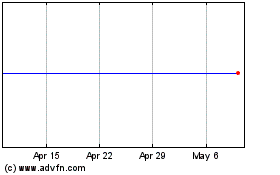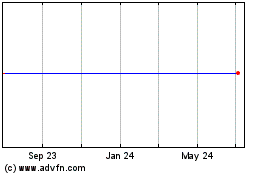BHP Tests Climate-Deal Scenario
September 29 2015 - 7:29AM
Dow Jones News
By Rhiannon Hoyle
SYDNEY-- BHP Billiton Ltd., the world's biggest miner, says a
global agreement on climate-change action would slow but not stop
demand growth for most of the commodities it produces.
Revealing projections for the first time as December's Paris
Climate Conference nears, BHP Chief Commercial Officer Dean Dalla
Valle assured investors in London Tuesday that the company has
"stress-tested" its global resources business, which includes coal
mines and oil fields.
The test: Could it withstand policy shifts that would follow an
agreement limiting carbon emissions to cap global average
temperatures at no more than 2 degrees Celsius (3.6 degrees
Fahrenheit) above preindustrial levels?
The conclusion, according to the BHP report: "Even in an orderly
or rapid shift to a 2-degree world, we forecast growth in long-term
demand for most of our commodities, although at a slower pace than
in [our] central case." That "central case" assumes an average
temperature rise of 3 degrees.
Mr. Dalla Valle added, though, that "the opportunities and risks
associated with climate change will not be spread evenly between
businesses or sectors." Energy coal, used to generate electricity,
would be worst hit, BHP projected, as energy providers switch to
natural gas or renewable technology. BHP added, though, that this
switch could drive up demand for its own gas and uranium.
Mr. Dalla Valle, who called the report "a major step forward in
disclosure," said measures to reduce emissions in steel
manufacturing could also increase the price BHP receives for its
iron ore, which tends to be higher-quality than some rival
miners'.
Assuming "an orderly transition" between now and 2030 to meet a
2-degree climate target, BHP forecast a doubling in earnings before
interest, taxes, depreciation and amortization. That is only
marginally below the company's core outlook, based on a 3-degree
trajectory.
"As climate change risk continues to evolve, so too will our
approach," said Mr. Dalla Valle, referring to BHP's strategy. In
recent times the company has shifted its investment focus to copper
and oil from coal and iron ore.
Climate change has been high on U.S. President Barack Obama's
agenda as he approaches his final year in office. He has been
working to secure support for an international climate-change
agreement ahead of the Paris meeting, which will bring world
leaders together with the aim of clinching a deal to succeed the
Kyoto Protocol.
United Nations officials concede an accord on a 2-degree cap is
unlikely, given that many major carbon emitters haven't submitted
emissions targets. Indian Prime Minister Narendra Modi this week
expressed "uncompromising commitment on climate change" but stopped
short of making new pledges for reducing emissions.
Mr. Dalla Valle separately said BHP remains confident China's
economy is on track despite a drop in industrial profits in August
that was the biggest in four years, and shook world resources
markets. "No doubt there is going to be a lot of volatility, and I
think people are reading into that," he told reporters. But "we
haven't changed our position."
In August, BHP forecast China's economy will pick up speed to
meet Beijing's growth target for 2015 of about 7%.
Write to Rhiannon Hoyle at rhiannon.hoyle@wsj.com
Subscribe to WSJ: http://online.wsj.com?mod=djnwires
(END) Dow Jones Newswires
September 29, 2015 07:14 ET (11:14 GMT)
Copyright (c) 2015 Dow Jones & Company, Inc.
BHP (NYSE:BBL)
Historical Stock Chart
From Mar 2024 to Apr 2024

BHP (NYSE:BBL)
Historical Stock Chart
From Apr 2023 to Apr 2024
